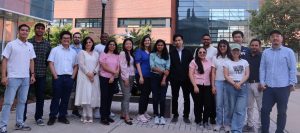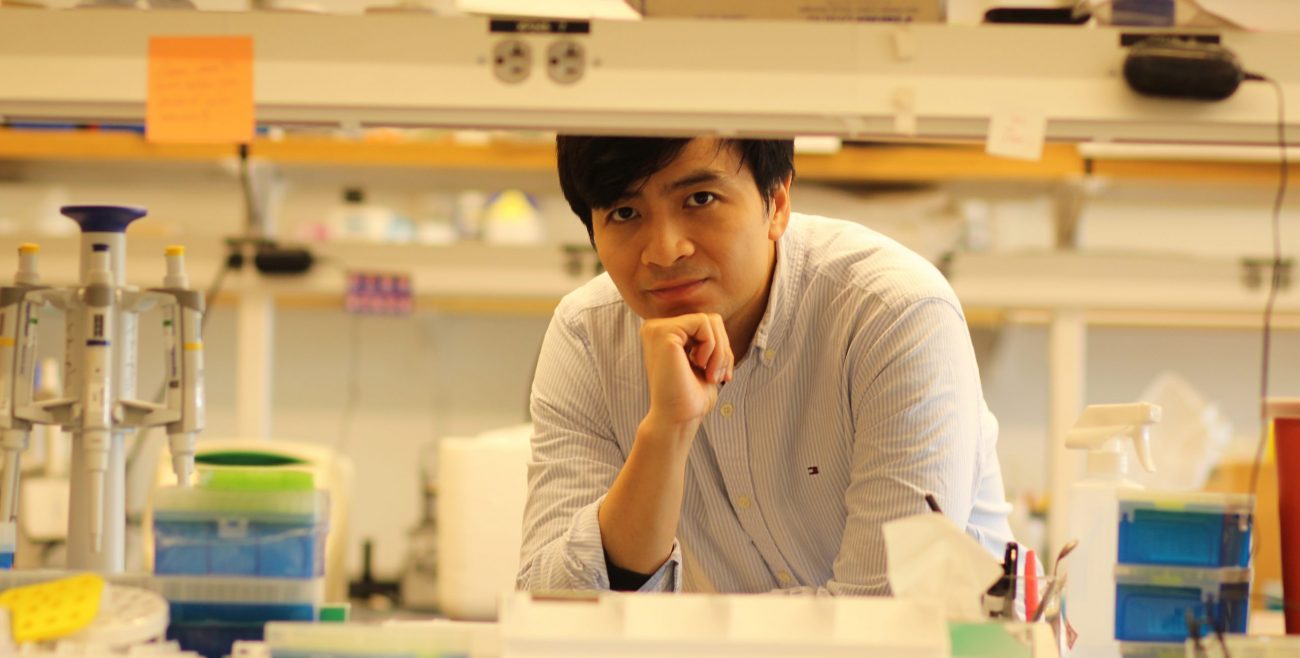Through millions in coveted grants, the National Institutes of Health (NIH) and the Bill and Melinda Gates Foundation are recognizing how impactful Thanh Nguyen’s research is to the field of biomedical engineering.
Nguyen, an associate professor of mechanical engineering and biomedical engineering, has already established himself as one of the top-funded researchers at UConn. The NIH is adding to that success by awarding Nguyen four R01 grants totaling more than $9.5 million, with $7.5 million going to UConn researchers.
His research is the interface of biomedicine, material engineering, and the use of nano- and microtechnology. Nguyen has made strides on multiple fronts, with multi-disciplinary projects dedicated to helping heal helping people with diverse afflictions.
“We are always motivated by medical problems that have a high impact on human health,” says Nguyen.
R01 grants are highly competitive, awarded to research and development projects that live up to the NIH’s mission to improve health, extend life, and reduce illness and disability.
For Nguyen, his collaborators, and students, the grants present an opportunity to improve technology to help bones and cartilage to heal. He is also working to develop improved methods to deliver lifesaving vaccines and antibodies to worldwide populations.

Two of the grants are brand new, providing $2.1 million and $1.5 million toward respective projects. On the former, Nguyen is the primary investigator on a project to stimulate and accelerate healing defects to the longest bones in the body, such as the femur and tibia.
“Bones in most parts of the body can regenerate themselves, but when you get a long and large bone injury, the body needs help to regenerate,” Nguyen says.
Significant long bone injuries are often treated with growth factors or stem cells to stimulate healing. However, the techniques often include serious side effects that can impair patients.
Nguyen and his team are working to minimize the danger through the application of safe biomaterials as an electrically active scaffold over a bone defect. The scaffold would be biodegradable and able to produce electrical charges, stimulating bone repair.
Concurrently, Nguyen is working with fellow researchers to provide needed antibodies to breastfeeding infants with HIV. Globally, more than 130,000 babies are infected with HIV annually, and certain antibodies have shown to be effective against the virus.
The second new R01 grant will fund the development microneedle technology to deliver multi-potent antibodies which can last a long time in the baby body to sustain the immune protection against infectious HIV virus. Currently, multiple injections are required, and the antibodies must be stored at cold temperatures. The process is expensive and burdensome.
Nguyen says microneedle patches would greatly simplify the process and reduce the cost of cold-chain storage. Along with the collaborators in Eastern Virginia Medical School (EVMS), Nguyen’s research would investigate the effectiveness of the anti-HIV patches in small animals and large animals like monkeys.
Nguyen says the treatment is applied similar to a nicotine patch, painlessly delivering the antibodies into the recipient. Ultimately, the patches will be tested in pediatric patients who have a high risk of HIV infection as a result of breastfeeding from HIV-infected mothers.
Besides these two grants, he received a $2.16 million grant to research how his invented biodegradable ultrasound technology can increase the effectiveness of chemotherapy in brain cancer patients.
The fourth grant, for nearly $2 million, investigates how tissue-scaffolding made of his lab’s invented biodegradable electrically active polymer can regrow cartilage, as successfully performed on rabbits. The treatment could be a game changer for osteoarthritis patients whose cartilage in body parts such as the knee has deteriorated through injury or aging.
Beyond the NIH, Nguyen has received significant support through the Bill and Melinda Gates Foundation in a $2.6 million project as the PI on development of a microneedle array patch capable of delivering multiple human vaccines at once.
In late September, the Gates Foundation awarded Nguyen another $4 million for his work on the microneedle patch. Nguyen and his team are working to scale up production of the patch, which can deliver multiple vaccines at ones. This includes vaccines or antibodies to fight diphtheria, tetanus, pertussis, HIV, and polio.
Once almost eradicated, polio continues to affect populations in developing countries, with the most cases reported in Afghanistan and neighboring Pakistan. Nguyen hopes the microneedle patch will make new progress in the effort to eliminate the threat of polio once and for all.
Now with $6.6 million in Gates Foundation funding, Nguyen is pleased to be able to expand his team, including offer more opportunities to undergraduate and postgraduate students.
Together, his prolific research funding has brought a total amount of $25 million funding to UConn since 2016 when he started as an assistant professor, a testament to the impact of his research.
“I am very grateful to the NIH and the Gates Foundation for the opportunity to pursue vaccination and biomedical engineering research at UConn,” Nguyen says.
Nguyen’s breakthroughs have led to numerous awards, more than 20 issued and pending patents, and an induction into the U.S. National Academy of Inventors. He is also a reputable mentor, adviser and collaborator, with his work currently supporting more than 21 people, including 11 post-doctoral and 10 Ph.D. students in his biomedical engineering lab.
While he has been successful as a fundraiser, Nguyen says it has taken many years and widespread publication to achieve his level of support. He backs his proposals through innovative ideas, significant problems to address and extensive scientific data, utilizing the resources at his disposal.
“We keep working and producing high quality research published in well-known scientific journals,” he says. “That has helped create a successful and impactful research program.”



